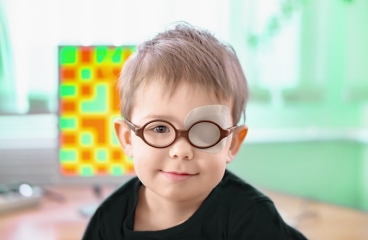
What is strabismus?
Strabismus means that both eyes do not look at the same thing at the same time. One eye may look straight ahead while the other eye looks in another direction. It is sometimes called "cross-eye" or "walleye." Surgery can fix this problem.
Your child will be asleep during the surgery. The doctor makes a cut over the white part of the eye to find the muscles that need to be fixed. The cut is called an incision. Then the doctor loosens or tightens the eye muscles and uses small stitches to hold the muscles in their new position. These small stitches are called sutures.
Most children go home after they wake up. The sutures in the eye don't need to be removed. They will dissolve in a few weeks.
How do you prepare for surgery?
Surgery can be stressful for both your child and you. This information will help you understand what you can expect. And it will help you safely prepare for your child's surgery.
Preparing for surgery
- Talk to your child about the surgery. Tell your child that this surgery will make your child's eyes healthier. Hospitals know how to take care of children. The staff will do all they can to make it easier for your child.
- Ask if a special tour of the surgery area and hospital is available. This may make your child feel less nervous about what happens.
- Plan for your child's recovery time. Your child may need more of your time right after the surgery, both for care and for comfort.
- Understand exactly what surgery is planned, along with the risks, benefits, and other options.
- Tell the doctor ALL the medicines, vitamins, supplements, and herbal remedies your child takes. Some may increase the risk of problems during the surgery. Your doctor will tell you if your child should stop taking any of them before the surgery and how soon to do it.
The day before surgery
- A nurse may call you (or you may need to call the hospital). This is to confirm the time and date of your child's surgery and answer any questions.
- Remember to follow your doctor's instructions about your child taking or stopping medicines before surgery. This includes over-the-counter medicines.
What happens on the day of surgery?
-
Follow the instructions exactly about when your child should stop eating and drinking. If you don't, the surgery may be canceled. If the doctor told you to have your child take their medicines on the day of surgery, have your child take them with only a sip of water.
-
Have your child take a bath or shower before you come in. Do not apply lotion or deodorant.
-
Your child may brush their teeth. But tell your child not to swallow any toothpaste or water.
-
Do not let your child wear contact lenses. Bring your child's glasses or contact lens case.
-
Be sure your child has something that reminds them of home. A special stuffed animal, toy, or blanket may be comforting. For an older child, it might be a book or music.
At the hospital or surgery center
- A parent or legal guardian must accompany your child.
- Your child will be kept comfortable and safe by an anesthesia provider. Your child will be asleep during the surgery.
- The surgery will take about 1 hour.
- After surgery, your child will be taken to the recovery room. As your child wakes up, the recovery room staff will monitor their condition. The doctor will talk to you about the surgery.
- You will probably be able to take your child home after they wake up.
- In some cases, the doctor uses a type of suture that can be adjusted. This lets the doctor fine-tune how the eye lines up. If this is done, the doctor will put a drop of anesthetic on the eye.
Current as of: July 31, 2024
Author: Ignite Healthwise, LLC Staff
Clinical Review Board
All Healthwise education is reviewed by a team that includes physicians, nurses, advanced practitioners, registered dieticians, and other healthcare professionals.

